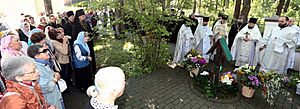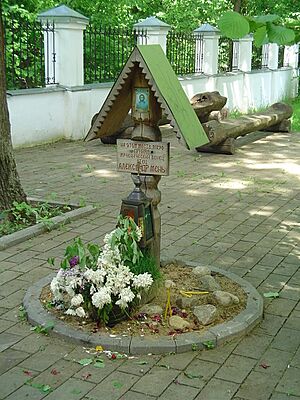Alexander Men facts for kids
Quick facts for kids Alexander Men |
|
|---|---|
| Александр Владимирович Мень | |
| Religion | Christianity |
| Denomination | Eastern Orthodoxy |
| Church | Russian Orthodox Church |
| Education | Leningrad Theological Seminary Moscow Theological Academy |
| Personal | |
| Nationality | Soviet Union |
| Born | 22 January 1935 Moscow, Russian SFSR, Soviet Union (now Moscow, Russia) |
| Died | 9 September 1990 (aged 55) Semkhoz, Russian SFSR, Soviet Union (now Semkhoz, Russia) |
| Spouse | Natasha Grigorienko |
| Parents | Vladimir Men, Yelena Tsuperfeyn |
| Senior posting | |
| Based in | Novaya Derevnya |
| Title | Pastor |
| Period in office | 1970 - 9 September 1990 |
| Reason for exit | Assassinated |
| Religious career | |
| Students | Georgy Chistyakov Gleb Yakunin |
| Ordination | 1 September 1960 |
| Website | http://www.alexandrmen.ru/ |
Alexander Vladimirovich Men (Russian: Алекса́ндр Влади́мирович Мень, romanized: Aleksandr Vladimirovich Men'; 22 January 1935 – 9 September 1990) was a Russian Orthodox priest and theologian. He was also a biblical scholar and writer. He wrote about religion, Christian beliefs, and Orthodox worship.
Father Alexander Men wrote many books, including his most famous work, History of Religion: In Search of the Way, the Truth and the Life. One part of this book, Son of Man, helped many people in the Soviet Union learn about Christianity. He also secretly baptized many people. In 1990, he started an Orthodox open university. He also opened one of the first Sunday schools in the USSR and a charity group. His ideas and work still inspire Christians in Russia and around the world.
Alexander Men was murdered on 9 September 1990. He was attacked with an axe near his home in Semkhoz, Russia. The reasons for his murder are still not clear today.
Contents
Who Was Alexander Men?
His Family Background
Alexander Men's father, Vladimir Men, was born in 1902. He studied at a Jewish religious school when he was a child. He also went to two universities and worked as a chief engineer.
Alexander's mother, Yelena Men, was born in Switzerland in 1908. Her parents met while studying chemistry there. Yelena was interested in Christianity from a young age. She studied the Orthodox faith in high school. In 1934, she married Vladimir.
His Early Life and Faith
Alexander Men was born in Moscow on 22 January 1935. His family was Jewish. When he was six months old, he and his mother were secretly baptized. This happened in Zagorsk by a priest from the Catacomb Church. This church did not work with the Soviet government.
When Alexander was six, his father was arrested. His father was held for over a year and then sent to work in the Ural Mountains. Alexander studied at the Moscow Fur Institute in 1955. He was later expelled from another institute in 1958 because of his religious beliefs. A month later, he became a deacon.
Becoming a Priest
On 1 September 1960, Alexander Men became a priest. He had just finished his studies at the Leningrad Theological Seminary. He continued his studies at the Moscow Theological Academy, finishing in 1965.
Father Alexander Men became a very respected leader among Christians. This included Roman Catholics and Protestants, as well as Orthodox believers. He served in several churches near Moscow.
In the 1970s, he became well-known in Russia's religious community. The KGB, the Soviet secret police, bothered him because he actively shared his faith. In 1974, the head of the KGB, Yuri Andropov, wrote about him. He said that Father Men and other priests were spreading ideas that went against the Soviet government.
In 1984, Father Men was questioned by the authorities. He was threatened with being stopped from serving in any Moscow churches. A newspaper article in 1986 accused him of trying to create an "anti-Soviet underground."
In the late 1980s, he started using mass media to teach about religion. He gave many lectures to large crowds. He even had an offer to host a TV show about religion.
In 1990, Father Men helped start the Russian Bible Society. He also founded the Open Orthodox University and a journal called "The World of the Bible." He worked hard to teach Russians about the Orthodox faith. Some people called him a "modern-day apostle" for his work. However, some Orthodox leaders felt that some of his views were not traditional enough.
Father Alexander Men also strongly supported charity work. He helped start a group at the Russian Children's Clinical Hospital. This group was later named after him.
His Unsolved Murder
On Sunday morning, 9 September 1990, Father Alexander Men was murdered. He was walking from his home in Semkhoz, a village near Moscow, to the train station. He was going to catch a train to Novaya Derevnya to lead a church service. He had served at that church for 20 years.
He was attacked with an axe. The murder happened around the time the Soviet Union was breaking apart. Even though the government ordered more investigations, the murder is still unsolved. His funeral was held on the same day that the Orthodox Church remembers the beheading of John the Baptist.
A police general, Vyacheslav Pankin, spoke about the case. He said that a suspect confessed, but there was no other evidence. Even the axe the suspect gave them was not proven to be the murder weapon. The priest's bag with his church clothes also disappeared. Many ideas were checked, but no strong evidence was found.
What Were His Ideas?
Alexander Men believed that the history of religion started long before Christianity. He saw Christianity as the highest point of religious experience. He wrote that the "Good News" of the Gospel answered the hopes of people throughout history. He felt that humanity had searched for truth in many ways, and Christianity was the answer.
In his book History of Religion, he explained his approach. He said that he wanted to explore truth alongside people of different faiths. He believed this would help readers understand how different religions prepared the world for the coming of Jesus Christ. He hoped his books would show that the history of religions was not just a collection of mistakes. Instead, he saw them as different paths leading to the "ocean of the New Testament."
Father Men also believed that even in ancient pagan beliefs, there were hints of the Gospel. He pointed out that Apostle Paul used an altar to the "Unknown God" in Athens to start his sermon.
His Important Books
Alexander Men's most important work is his History of Religion. It has seven volumes and is called In Search of the Way, the Truth, and the Life. In these books, he looked at the history of non-Christian religions. The seventh volume, Son of Man, is very famous. Because of persecution in the Soviet Union, these books were first published outside the country under a different name.
Father Alexander Men was one of the first to create "samizdat" (self-publishing) Christian books in the 1960s. This meant he secretly copied and shared his writings.
Many of his works have been published in Russian, including:
- Heaven on Earth (1969)
- Where Did This All Come From? (1972)
- How to Read the Bible? (1981)
- World Spiritual Culture (1995)
- The History of Religions (Volumes 1–2, 1997)
- The First Apostles (1998)
- Isagogics: Old and New Testaments (2000)
- Bibliological Dictionary (Volumes 1–3, 2002)
- Mystery, Word, Image (1980)
His Lasting Impact
Since his death, Father Men's ideas have been debated within the Russian Orthodox Church. Some conservative groups disagree with his strong support for ecumenism, which means working towards unity among different Christian churches. However, many people support him. Some even believe he should be recognized as a saint.
His lectures are still played on Russian radio. His books, which once had to be printed secretly abroad, are now widely available in Russia. Many Russian Orthodox churches encourage people to follow his example. Two churches have been built where he was murdered, and many believers see him as a martyr.
In December 1990, the Alexander Men Foundation was started in Riga. In 2004, the Apostolic Orthodox Church recognized him as a saint.
The Moscow Patriarchate has started a project to publish all of Father Men's collected works in 15 volumes.
Alexander Men's son, Mikhail Men, is a Russian political figure. He has served as a governor and a minister in the government. He is also a musician.
Positive Views on His Work
Many Orthodox Christians have a positive view of Alexander Men's work. Arkady Mahler said in 2010 that many people came to the Russian Orthodox Church because of Father Alexander's sermons. He noted that Father Alexander was a "real people's preacher." People from all over the Soviet Union sought him out to learn about God from his writings.
Archpriest Andrei Tkachev praised Father Men, saying he "took on the heaviest burden - working with atheistic intellectuals."
In February 2021, Metropolitan Hilarion (Alfeev) said that Father Alexander Men was an "outstanding preacher, catechist, and missionary." He added that if it is proven that his death was martyrdom, he could be recognized as a saint.
See Also
- Georgy Chistyakov
- List of unsolved murders
|
 | Janet Taylor Pickett |
 | Synthia Saint James |
 | Howardena Pindell |
 | Faith Ringgold |



